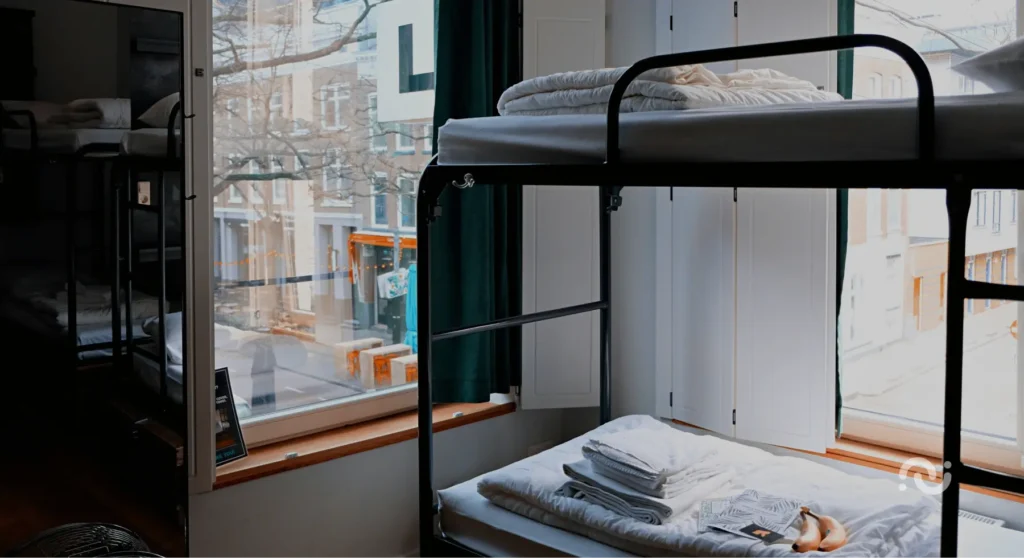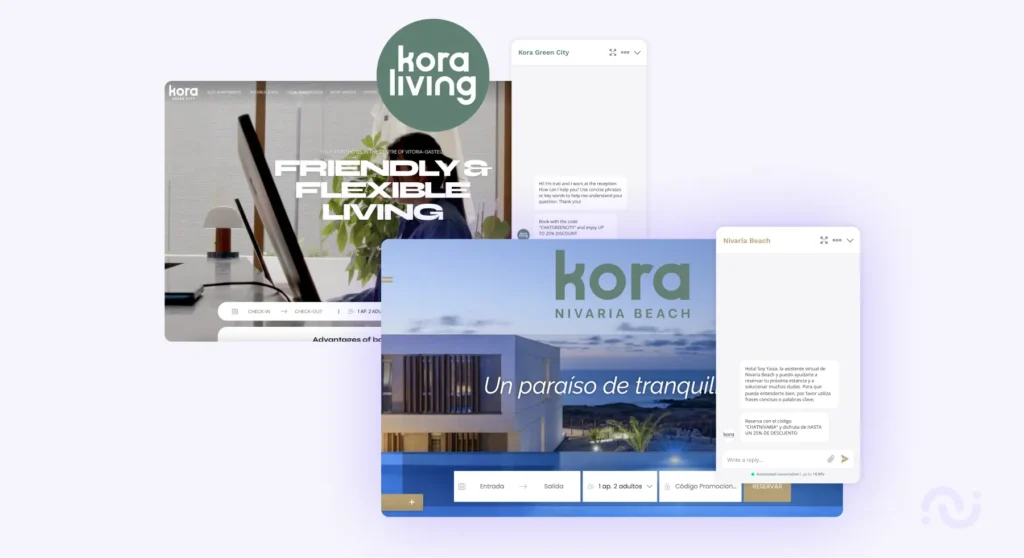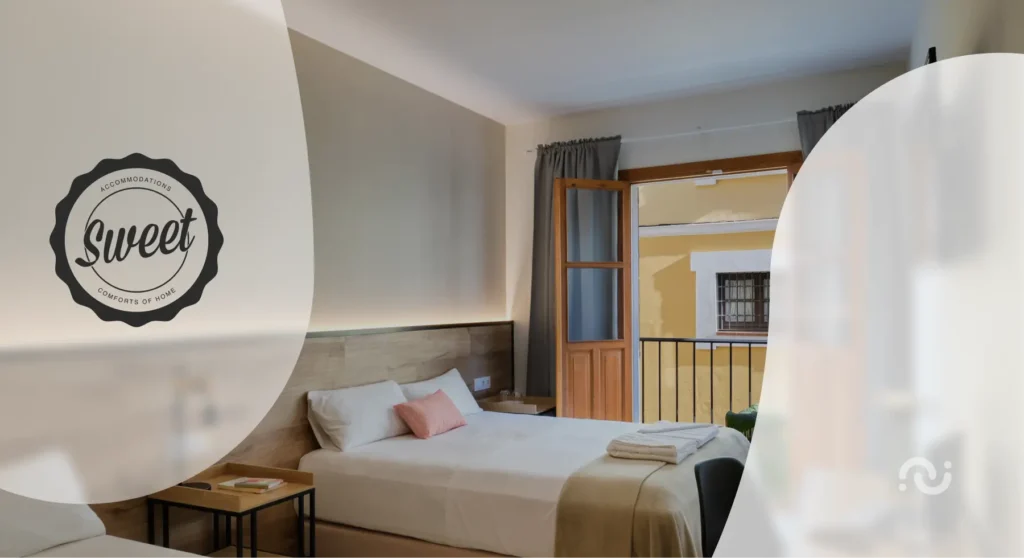All cards are on the table. What's your pick?
As a hotelier, you’re managing a growing mix of accommodation options while navigating ever-changing guest expectations. Hotels and hostels are often compared, but the operational and strategic differences between the two aren’t always clear. Let’s break it down and explore what sets these models apart.
What’s the real difference between a hotel and a hostel? Why are hostels appealing to such a wide range of travellers these days? More importantly, what can hoteliers learn from the hostel model to improve their operations, and how can AI help make it happen? Let’s break it down.
In this article, we will see:
Ready to sharpen your hotel or hostel strategy? Let’s get started!
A hotel provides temporary accommodation and often includes useful extras like reception services, housekeeping, dining options, and spaces for wellness or work. It’s all about offering a comfortable, convenient stay for guests while meeting their everyday needs.
Hotels cater to a diverse clientele:
The goal of a hotel is to provide a standardised and optimised experience, where every detail is designed to maximise comfort and customer satisfaction.
A hostel, or youth hostel, is an affordable option that prioritises shared spaces and social connections.
Unlike hotels, hostels often offer:
Hostels are popular with a young, adventurous crowd. They’re a go-to choice for backpackers chasing authentic experiences, digital nomads seeking budget-friendly stays, and groups of friends or students travelling together.
The success of hostels comes from their focus on building a sense of community and offering a social experience that’s truly unique. Unlike resorts, which blend accommodation and entertainment with a focus on luxury, hostels prioritise interaction and friendliness. They’re all about bringing people together in an approachable, accessible way.

When choosing between a hotel and a hostel, most people assume it’s just about room comfort or layout. But the differences go far beyond that.
An establishment’s strategy is shaped by key factors: who the target audience is, how the business operates, the customer experience it delivers, and its profitability.
Let’s explore how these differences influence how hoteliers manage their operations and position themselves in the market.
Hotels and hostels appeal and cater to different types of travellers, which influences how they operate and the value they provide.
| Criteria | Hotel | Hostel |
| Type of clients | Business travellers, families, tourists | Backpackers, digital nomads, students |
| Length of stay | Short to medium stays (1-7 nights) | Longer and more flexible stays |
| Budget | Moderate to high | Cost-saving |
| Experience | Comfort and premium services | Friendly and social atmosphere |
| Level of service | Standardised, sometimes high-end | Minimal, focused on sharing |
| Traveller’s goal | Convenient and comfortable stay | Immersive and interactive experience |
The source of revenue for a hotel and a hostel is not the same.
Hotels make most of their money by selling rooms and offering extra services like breakfast, room service, spa treatments, or meeting room rentals. It’s all about providing guests with options that add value to their stay while driving revenue for the business.
The aim is to boost occupancy rates while getting the most revenue from every room (RevPAR).
The hospitality industry tracks more than just room bookings – TRevPAR (Total Revenue per Available Room) is a key metric. It captures all revenue generated from services like restaurants, wellness offerings, and events, providing a complete picture of a hotel’s performance.
Hostels operate with a simple business model: offer affordable accommodation and generate additional revenue from shared spaces.

Travellers today expect more from their hotel stays, and sticking to a rigid, outdated model just doesn’t cut it anymore. The guest experience is now a major way for hotels to stand out. Taking a few ideas from the hostel approach – like creating social spaces or fostering a sense of community – can bring fresh value to traditional hotel offerings.
Hostels have done a great job appealing to younger, flexible travellers looking for authentic experiences. Hotels can take a page out of their book to attract this audience, increase bookings, and tap into the preferences of the next generation of guests.
Hostels are great at bringing people together, thanks to their inviting communal spaces. Unlike hotels, where guests typically stay in their rooms, hostels encourage interaction. Whether it’s coworking areas, cosy lounges, or shared kitchens, these spaces create opportunities for guests to connect, share experiences, and build a sense of community.
Hotels are starting to see the value in rethinking how they use their spaces. Especially in cities, many are creating lobbies that go beyond just check-ins – they’re becoming places to relax, work, and connect. Think cosy lounges with fast WiFi, shared libraries, and open workspaces that even non-guests can use. It’s all about creating spaces that work for everyone, whether you’re a guest or just stopping by.
Hotels are tapping into a smart trend: turning their cafés and bars into spaces open to everyone – not just guests. This simple shift brings in a whole new crowd and boosts revenue. It’s a practical way to make the most of unused areas, attract more visitors, and refresh the hotel’s image in the process.
Hostels are known for organising events and activities that make stays more enjoyable and memorable for their guests. These experiences not only keep visitors loyally coming back but also help hostels stand out on booking platforms, thanks to the glowing reviews they generate.
Hotels can boost engagement and attract more guests by hosting events that appeal to their audience. For instance, city hotels are finding success with after-work gatherings, live music nights, and themed events. These activities create a welcoming vibe, bringing in local visitors while also offering something extra for travellers.
Hotels focused on well-being are embracing activities like yoga, meditation, and local produce tasting workshops. These offerings help set them apart from competitors while giving guests a more memorable experience – one that supports charging a premium rate.
These activities don’t have to be costly or complicated to set up. The goal is simple: give customers a reason to stay longer or come back. That’s where digital tools and AI step in. With tools like chatbots and customer engagement platforms, hotels can create personalised events that match each guest’s preferences, making their experience more memorable and enjoyable.
One reason hostels are so successful is their flexible pricing strategy. Unlike hotels, where rates tend to stay fixed, hostels offer options for every budget – shared dorms, private rooms, and everything in between. This variety helps them appeal to a broader audience and keep their rooms full.
With growing demand for more flexible stays, some hotels are trying out hybrid options. These might include:
Hybrid hotels are a great example of how hospitality is evolving. They combine the comfort and style of luxury hotels with the flexibility and budget-friendly options of hostels. These hotels cater to modern travellers by offering a mix of premium private rooms, sleek dorms, and shared living spaces, making them appealing to a wide range of guests.

Artificial intelligence is changing the hospitality industry by simplifying tasks, improving communication with guests, and making their stay more enjoyable. From quick messaging campaigns to smart chatbots and online check-ins, AI helps hotels meet guest expectations while giving staff more time to focus on personalised service.
Let’s take a look at how three hospitality brands have successfully incorporated AI into their strategy and the real-world results they’ve achieved:
Hotels often struggle to boost revenue by promoting extra services like spas, restaurants, or activities. AI helps tackle this challenge by automating guest communication and reaching out before they even check in. This ensures guests are informed and engaged early, making it easier to showcase what your hotel has to offer.
Hoteliers are always looking for ways to save time while still delivering great service. With AI, they can automate repetitive guest requests, giving staff more time to focus on creating a personalised experience for their guests.
Reducing wait times at the reception and making guest arrivals smoother are key goals for hoteliers. AI helps automate the check-in process, improving the experience for travellers while making day-to-day operations easier for staff.

Artificial intelligence isn’t just for big hotels – hostels can make the most of it too. From increasing bookings to automating guest communication, AI can help you save time and deliver a smoother, more enjoyable experience for your visitors. Affordable doesn’t mean outdated – start using AI to make your hostel stand out.
Here’s how three hostels are using AI to improve their operations and deliver real, measurable results:
Hostels are always looking for ways to boost revenue, whether it’s through offering breakfast, towel rentals, or local activities. With AI, promoting these services and improving their conversion rates can be automated, saving time and driving results.
💡Why does it work?
WhatsApp, a preferred channel for young travellers
Upselling campaigns on WhatsApp deliver engagement rates far higher than email. Young travelers, the core audience for hostels, prefer quick, mobile-friendly communication over slower, less interactive emails. WhatsApp meets them where they already are, making it the go-to channel for better connections and results.
Reducing reliance on online travel agencies (OTAs) is a tough challenge for hostels. But with AI, simplifying the booking process becomes much easier, helping you draw in more direct customers and keep more control over your bookings.
💡Why does it work?
The importance of direct bookings for a flexible clientele
Travellers who stay in hostels tend to be spontaneous and flexible, often relying on comparison sites and mobile platforms to plan their trips. By using chatbots and conversational AI to enable direct bookings, Lub d reduced its dependency on OTAs and saw an impressive 7.9x return on investment, driving higher profits.
💡Why does it work?
A generation accustomed to instant solutions and autonomy
Young travellers, like digital nomads and backpackers, appreciate quick and easy solutions. The 30% rise in online check-ins at Sweet Accommodations proves that hostel guests prefer skipping the reception line and taking care of things themselves.

The hospitality industry is moving fast, with guests expecting more personalised, immediate, and hassle-free experiences from different types of tourist accommodation. Whether it’s a hotel or a hostel, the mission is the same: make things simple and enjoyable for guests while keeping operations efficient and profits strong.
With smarter AI tools, hotels can now handle customer interactions automatically, boost direct bookings, and make more from upselling. These solutions not only improve the travel experience but also give your team more time to focus on what really matters: delivering great service to your guests.
Book a free demo with one of our experts now and discover how artificial intelligence can transform your hotel or hostel – or perhaps a hybrid model? – and boost your performance!
Sign up for our monthly newsletter to receive free resources and updates on impactful AI applications in hospitality.